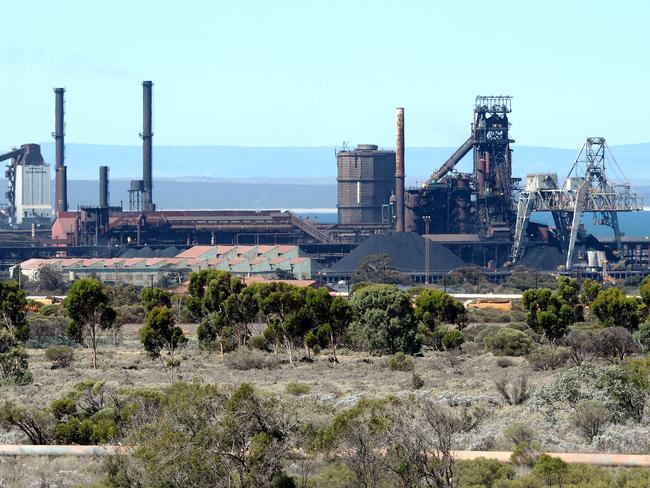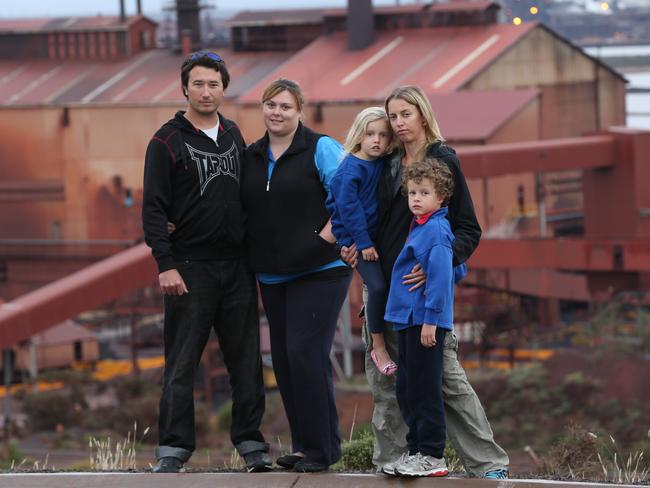Whyalla is on ‘knife-edge’ of collapse as steelworks faces closure
IT IS the second biggest regional town in South Australia but some say it could be wiped out in an instant.
IT IS the second biggest regional city in South Australia but some say it could be wiped out in an instant.
The future of Whyalla, once the subject of a viral song-and-dance routine, hinges on talks in the coming days.
Once a proud steelmining town, its reliance on the jobs that the Arrium steelworks provides, could now be its undoing.
The troubled steel and mining group employs 1600 workers in Whyalla, which has a population of about 22,000 people, and an extra 1400 contractors in South Australia.
Across Australia, there are 7000 jobs under threat.
According to The Advertiser, Whyalla Deputy Mayor Tom Antonio declared that “we’re on a knife’s edge” and warned that if the Arrium steelworks closed, it would come at a “catastrophic” cost to the city, the state and the nation.
“We’re all hurting, we’re all bleeding,” he said.
Local business owners say Whyalla risked becoming a ghost town if the steelworks closed.
“Potentially we stand to be the largest ghost town in Australia,” Caffe Sempre owner Alessandro Parisi told AAP.
BJ’s Deli owner Brenda Bowey said the decline of the steelworks had been a long time coming.
“It would be great if (the Commonwealth) could help Arrium, which in turns helps all those little people. But it’s too little, too late,” she said.
“This has been happening for years and they’ve been turning a blind eye to it.”
WHAT HAPPENED?
Arrium used debt to expand iron ore production during the mining boom but slowing Chinese demand and a glut of supply from larger rivals such as BHP Billiton and Rio Tinto, has resulted in a collapse in iron ore and steel prices over the past two years.
“This company has been unsustainable for a while. They paid too much for expanding their iron ore business, and the downturn in prices has exposed that,” Morningstar mining analyst Matthew Hodge said.

The city once looked forward to a golden future and was even earmarked to grow to 100,000 people because of the steelworks. But Whyalla has been in decline for decades, after it reached a peak population of 33,000 in 1976.
Administrator Grant Thornton has promised to keep the business running while it undertakes a comprehensive review of Arrium’s businesses.
Administrators will hold their first meeting with creditors within eight days.
Any future rescue effort involving the federal and state governments is likely to focus on the Whyalla steelworks, which appear to be the most vulnerable of Arrium’s assets.
But the company also employs 2800 workers in NSW, 900 in Queensland, 900 in Victoria, 350 in Western Australia and 130 across Tasmania, the Northern Territory and the ACT.
HAVE I HEARD OF THIS PLACE BEFORE?
Yes, the town was placed at the centre of a scare campaign on the carbon tax.
Then opposition leader Tony Abbott said Whyalla would be “wiped off the map” by Julia Gillard’s carbon tax during a visit there in 2011.
In 2012 then Labor Trade Minister Craig Emerson mocked the fears with his own little tune, singing “No Whyalla Wipeout there on my TV” to the tune of the Skyhooks song Horror Movie. His comical performance went viral.
Although the Abbott Government was successful in getting rid of the carbon tax in 2013, Whyalla is still on the verge of a wipe-out two years later.
BAILOUT?
The Federal Government would prefer the company to trade its way out of its difficulties, rather than rely on a taxpayer-funded bailout to continue.
Neither Arrium nor the administrators had asked the government for direct assistance, Federal Industry Minister Christopher Pyne said, but he is meeting with administrators on Friday.
Mr Pyne said the government had announced it was bringing forward a major upgrade of the rail track between Adelaide to Tarcoola to assist the company.
But Labor frontbencher Anthony Albanese believes the government could do more to ensure the use of Australian steel.
“It is a good thing the government has brought some of that works but there is more that could be brought forward that has a benefit for Australia as well,” he said.
Mr Pyne said he would welcome other project suggestions from the opposition, because the issue was beyond politics.

THE PROBLEM
Arrium owes more than $4 billion including $2.8 billion to its creditors, $1 billion to suppliers and about $500 million to staff, according to the ABC.
On Thursday Arrium called in administrators, saying talks with banks on a potential bailout package had collapsed.
Trading on its shares was suspended on Wednesday after Arrium’s lenders rejected a $1.23 billion offer from US private equity group GSO Capital Partners, as they would have had to accept steep losses on their debts.
The company has struggled to come up with alternative proposals acceptable to its lenders — who include Australia’s four major banks, several global banks and US bond holders.
South Australian Treasurer Tom Koutsantonis said the Whyalla steelworks would continue to operate while administrators took charge.
“Panic is not an option here,” he told reporters. “There will be no new redundancies at Whyalla. All employees across the country will be required to report to work as usual and will be paid.”
BREAKUP?
Another option could be for the group to be broken up.
“The administrators could go for another round of cost cuts, or decide to close down the iron ore and steel businesses,” Morningstar mining analyst Matthew Hodge said.
Top of any asset sale list would be the profitable MolyCop mining consumables business.
“It might also be easier to sell the MolyCop business, because banks will probably bring this to a head.”
Arrium abandoned an unsuccessful attempt to sell MolyCop — the world’s largest supplier of grinding media used in mining and construction — in January because it could not get an agreeable price.
POLICY FAILURE
Opposition Leader Bill Shorten urged Arrium’s board and its lenders to resolve their differences in the interests of workers.
“Clearly there is quite a dysfunctional relationship at that level,” he told reporters.
Independent Senator Nick Xenophon said Arrium’s struggles were a direct consequence of the policy failures of successive governments.
“Prime Minister Turnbull can turn this around at the stroke of a pen by insisting that not one cent of Australian taxpayers’ money for these infrastructure projects will be spent unless the economic effects of a procurement decision are considered,” he told AAP.
Construction, Forestry, Mining and Energy Union state secretary Aaron Cartledge said Arrium’s problems were the result of bad government policies that supported substandard imports over local steel.
“Christopher Pyne must level the playing field by stopping unfair imported steel shipments or Whyalla will be reduced to little more than a coffee stop on the way from Adelaide to Port Lincoln,” Mr Cartledge said.
WHERE ARRIUM OPERATES ACROSS AUSTRALIA
SA: 1600 employees. Arrium’s mining business includes mines in the Middleback Ranges and a port and steelworks at Whyalla.
NSW: 2800 employees. Electric arc furnace in Sydney, wire mills in Newcastle and Jindera, rod mill and tube mill in Newcastle. Also MolyCop mining consumables business in Newcastle.
VIC: 930 employees. Electric arc furnace at Laverton, wire mill in Geelong. Also operations at Scoresby, Lyndhurst and Port Melbourne.
QLD: 900 employees. Tube mill at Acacia Ridge.
WA/TAS/NT/ACT: 480 employees. Includes MolyCop operations in Kalgoorlie.



